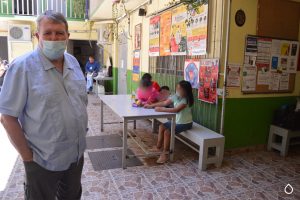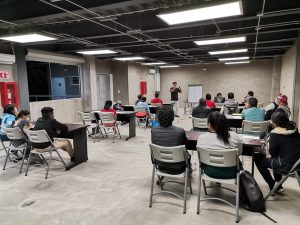THE INTERVIEW OF THE MONTH
“They teach me a lot, and I jokingly say that I am studying for my doctorate and the teachers are the migrants”: Father Pat Murphy, Director Tijuana Migrant House.
-For Father Pat, being a defender of the human rights of migrants is a vocation in which he has been working for 40 years.
-Our Center for Migrant Studies is a project that we envisioned 5 years ago and today it is a reality.

Initially from New York, he guarantees that he is utilized to convoluted life and in view of this when he was welcome to Tijuana to work he quickly said that indeed, Father Patricio Murphy or Father Pat as everybody knows him, shown up in 2013 to work at the Casa del Migrant and in 2021 he finished 40 years as a human rights defender.
Father Pat advises us in this meeting for our Newsletter “Voz Migrante”, that his heritage for the local area is that after showing up at the Casa del Migrante in Tijuana, he and the individuals who work there can uphold all individuals with regards to human versatility , who come to search for a rooftop and food, who with their workshops and work, accomplish that in any event one transient individual changes the chip and understands that not just in the United States their life can change.
In May, they initiated the Center for Migrant Studies, where they try to give instruments so that individuals in a setting of portability secure better position openings and approach a superior personal satisfaction on the line.
Here the full interview:
How were your beginnings as a Human Rights defender?
This year I praised 40 years of Father since I began in my first parish where we opened up to the Hispanic community and where we needed to protect transients on the grounds that there was a ton of separation around there.
Prior to showing up in Tijuana I was in Kansas City for a very long time working with the Hispanic community likewise opening entryways in various houses of worship, I don’t utilize that word (safeguard) precisely, yet it is important for my business, to be a dissident and shield for basic freedoms, protect rights of migrants and I came to Casa del Migrante in 2013.
Why did you decide to follow this path of defense of the human rights of migrants and come to Tijuana and the border?
I come from New York, obviously I love a convoluted life, in light of the fact that New York is extremely muddled, however I have never worked in New York, I left there to contemplate the college, at that point I went to consider Theology, I am an individual from the local area strict “Preachers of San Carlos Scalabrinianos” and my manager there welcomes me to come as an evangelist to Tijuana and work here. I never envisioned that at 60 years old I planned to come to work in Tijuana at the Casa del Migrante, however I have come extremely glad, it is important for my vocation.
What do you enjoy the most about this job?
As of now, in these months what I appreciate the most is when individuals come out with some achievement in their life, possibly they have some work and they go to lease a loft and return for lunch and talk about how life is going. Another vital second for me is the point at which a few families are leaving to demand refuge since they are weak families because of a sickness of a youngster or a grown-up and they can get the chance for shelter on the opposite side and this gives us incredible euphoria; when we have the likelihood to give up a family to the opposite side to start their haven interaction. In the end we don’t have the foggiest idea how it will end, however when they leave it is a snapshot of bliss that they feel thus do we.
What do you enjoy the least?
When there is defilement that exists from multiple points of view, the public authority’s little interest in migrants, they talk wonderfully however they are unadulterated untruths, since AMLO and his group have entered, they are not aiding anybody, I don’t have the foggiest idea what they are doing. I detest that a lot and it troubles me more than anything.
How much does the stories of the migrants you meet impact your personal life?
It impacts me a lot, it strains me a great deal, I in every case flippantly said, I am studying for my doctorate and the educators show me, and the real teachers are the migrants. Furthermore, what impacts me significantly more is this feeling of persistence that they can generally reach or they can come to, regardless of how long they proceed in the battle they generally think emphatically and that assists me with getting up in the first part of the day, in light of the fact that there is another family that we need to help. I’m additionally struck by the delight of youngsters who in some cases don’t comprehend why they are here and now and then it is dismal on the grounds that kids are not persuaded to go to the United States since they have their companions here, this was at that point their reality.
Any advice for those starting out in this task of defending migrants?
Indeed, you need to search for the right data and give the right data, not disclose to them that everybody will get refuge since they are not. That they make arrangements with individuals and commit their lives to strolling with individuals and not forward, not behind, that is vital and give data that is acceptable and right rather than false hope.
How did the idea of the Center for Migrant Studies come about?
Well, about 5 years ago we began to think that education and training is something very important for migrants, so we started courses here in the migrant’s house and in 2018, our first year we had more than 3,000 students in English and computer courses, gardening and electricity and that year was very successful.
Then we began to have the dream that we could have something bigger, a building that we call the “Scalabrinian Training Center for Migrants” and since May 7 this school has been a fact; Last week we started classes and if there is a lot of interest in this school for the migrants and that they can prepare for their future and get a better job and for some who can think twice to go to the other side, where there is nothing guaranteed, If they earn a lot of money but also spend a lot of money, then it’s a matter of changing the chip, a little bit, thinking that they can also do something here in Tijuana where there are many alternatives.

Foto cortesía Casa del Migrante (FB)
What courses or training can you find here?
We are barely initiating this program however, we do have an English course, digital literacy. We are working with INEA to assist them with getting their certificates. I have a book of scriptures course too and later we will get into things like pipes, power and workshops. We are gradually setting up the entire program and searching for educators to give the courses.
Everything is free, we don’t charge anything, we are searching for volunteer educators, yet we do sometimes pay our teachers.
How might they try out this study center?
They simply need to go to the entryway and say I want to study, what courses do they have? Furthermore, there is an exceptionally essential enrollment structure and classes start.
What we are doing at the Center for Migrant Studies is a model that can be duplicated in different havens and anyplace so they have choices forever.
Finally, what impact would you like to make with your work in the migrant community?
I tell you in a story that I tell a lot, there is a man who has a hamburger stand nearby and the other night the volunteers went to buy hamburgers and the man asked them if they were from here, from the Casa del Migrante, and then he said that he was here, he remembers me very well and he already has his business, he is already walking and he has a simple place, but he is already doing something in his life and he is very grateful for what he received here. And that is the model that we want to share, that the people who leave here come out better and with different dreams.
© Copyright 2020 Alma Migrante

